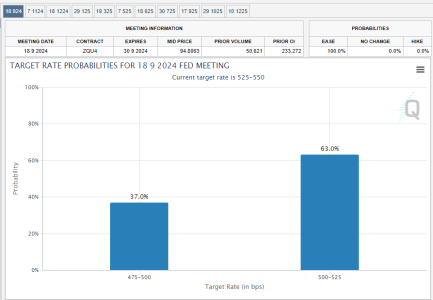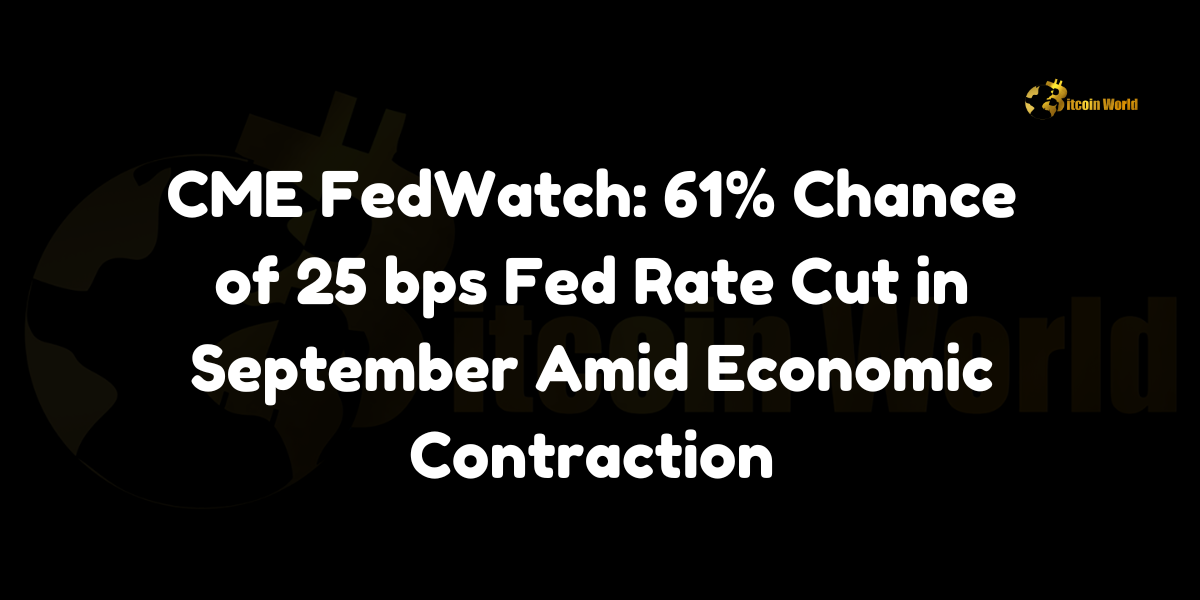CME FedWatch : 25 bps Fed rate cut September is now the favored scenario, with CME FedWatch indicating a 61% probability of such a move as the U.S. Federal Reserve responds to ongoing economic contraction. According to CME data, the U.S. ISM August Manufacturing PMI report, which signaled continued contraction in the manufacturing sector, has prompted traders to increase the likelihood of a rate cut. While a 25 basis point (bps) cut remains the most likely outcome, the probability of a larger 50 bps cut has risen from 30% to 39%.

Economic Context and PMI Data
The recent ISM Manufacturing PMI report points to persistent economic challenges, which have fueled expectations of more aggressive monetary easing from the Federal Reserve. The continued contraction in the manufacturing sector signals that the U.S. economy is still grappling with sluggish growth, despite previous rate hikes aimed at curbing inflation.
- Manufacturing PMI: The PMI report showed that the U.S. manufacturing sector remains in contraction territory, further intensifying calls for the Fed to take more decisive action to support economic growth. This contraction has led market participants to adjust their rate cut expectations, with a growing belief that the Fed may consider a more significant reduction if economic conditions worsen.
50 bps Rate Cut Gaining Momentum
While the 25 bps cut is still the favored outcome, the likelihood of a 50 bps cut has increased, rising from 30% to 39%, according to CME data. This shift reflects traders’ growing concern over the economic outlook and the potential need for more aggressive intervention by the Fed to stimulate growth.
- Traders’ Sentiment: Market sentiment is increasingly leaning toward the possibility of a 50 bps cut, as the economic contraction becomes more pronounced. A larger cut would send a stronger signal of the Fed’s commitment to supporting the economy, particularly if further data shows additional weakening in key economic indicators.
Key Factors: August Employment Report
The upcoming August employment report, set to be released on Friday, is expected to be a critical factor in the Fed’s decision-making process. Economists are forecasting a rebound in job growth, with 160,000 new jobs expected, while the unemployment rate is anticipated to dip slightly to 4.2%. The labor market’s performance could either reinforce or weaken the case for a rate cut, depending on the strength of the data.
- Employment Growth: A positive jobs report could reduce the urgency for a larger rate cut, as improving employment figures would suggest that parts of the economy remain resilient. However, if job growth falls short of expectations or unemployment rises, it could tip the scales toward a more aggressive 50 bps cut.
- Unemployment Rate: The unemployment rate, projected to drop to 4.2%, will also be closely watched. Any deviation from this forecast could influence the Fed’s final decision, as a higher-than-expected unemployment rate might indicate deeper economic troubles.
Conclusion
The 25 bps Fed rate cut September scenario remains the most likely outcome, with a 61% probability, but the increasing chance of a 50 bps cut reflects growing concerns about the state of the U.S. economy. The upcoming August employment report will be a crucial factor in determining the Fed’s course of action, as it assesses whether a larger rate cut is necessary to counteract economic contraction.
As market participants await further data, the Federal Reserve’s decision will play a pivotal role in shaping economic expectations for the rest of the year. Whether the Fed opts for a moderate 25 bps cut or a more aggressive 50 bps reduction, the move will have significant implications for the financial markets and broader economic outlook.
To learn more about the innovative startups shaping the future of the crypto industry, explore our article on latest news, where we delve into the most promising ventures and their potential to disrupt traditional industries.





